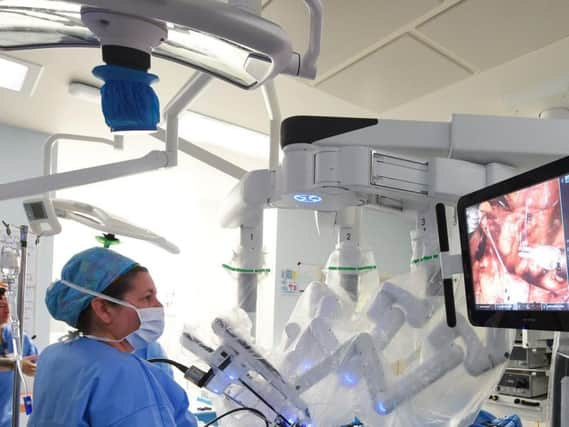Musician 'drums up' support for robotic prostate surgery


Gordon Wilson, who toured the world with Susan Boyle and also played drums with Love and Money and the Blue Nile was diagnosed with prostate cancer last October and had the choice to opt for radiotherapy or undergo surgery.
Until recently men with prostate cancer had few choices, with the only surgery option being a prostatectomy, which involves making large incisions and the patient experiencing a number of unpleasant side effects.
Advertisement
Hide AdAdvertisement
Hide AdTraditional surgery would see the entire cancerous prostate being removed with a risk of heavy blood loss, post-op infections, long hospital stays, and considerable pain. Patients were often affected by a loss of bladder control and sexual function due to delicate nerves around the prostate gland being severed.
However Mr Wilson was admitted to Glasgow’s Queen Elizabeth University Hospital (QEUH) where he was able to receive a less invasive operation using the £1.9 million Da Vinci Robot. The cutting edge technology which was funded by Prostate Scotland alongside local health boards and the Scottish Government offers precision keyhole surgery.
He said: “I met with the surgeon, Mr Imran Ahmed, and he outlined that in my case this new robotic surgery may be the best option.
“I read as much information as I could on the da Vinci robot to fully understand how it has moved on from traditional surgery and to learn the advantages of choosing that course of treatment.”
The da Vinci robotic prostatectomy enables surgeons to overcome many of the shortcomings of traditional prostate surgery and is a less traumatic and minimally invasive prostate cancer treatment.
It uses finely controlled robotic instruments to perform the operation safely and leads to better patient recovery and outcomes. Sitting at the da Vinci surgical console in the QEUH, Mr Ahmed controls the robot which is made up of high-resolution cameras and micro-surgical instruments. Powered by state-of-the-art robotic technology, his hand movements are translated into precise movement of the instruments.
Mr Wilson added: “For the procedure you’re talking about fractions of a millimetre and with that level of precision the robot can make a huge difference. The lack of side effects was a big factor in my decision to go with the robotic prostatectomy as there is a marked difference in recovery time.”